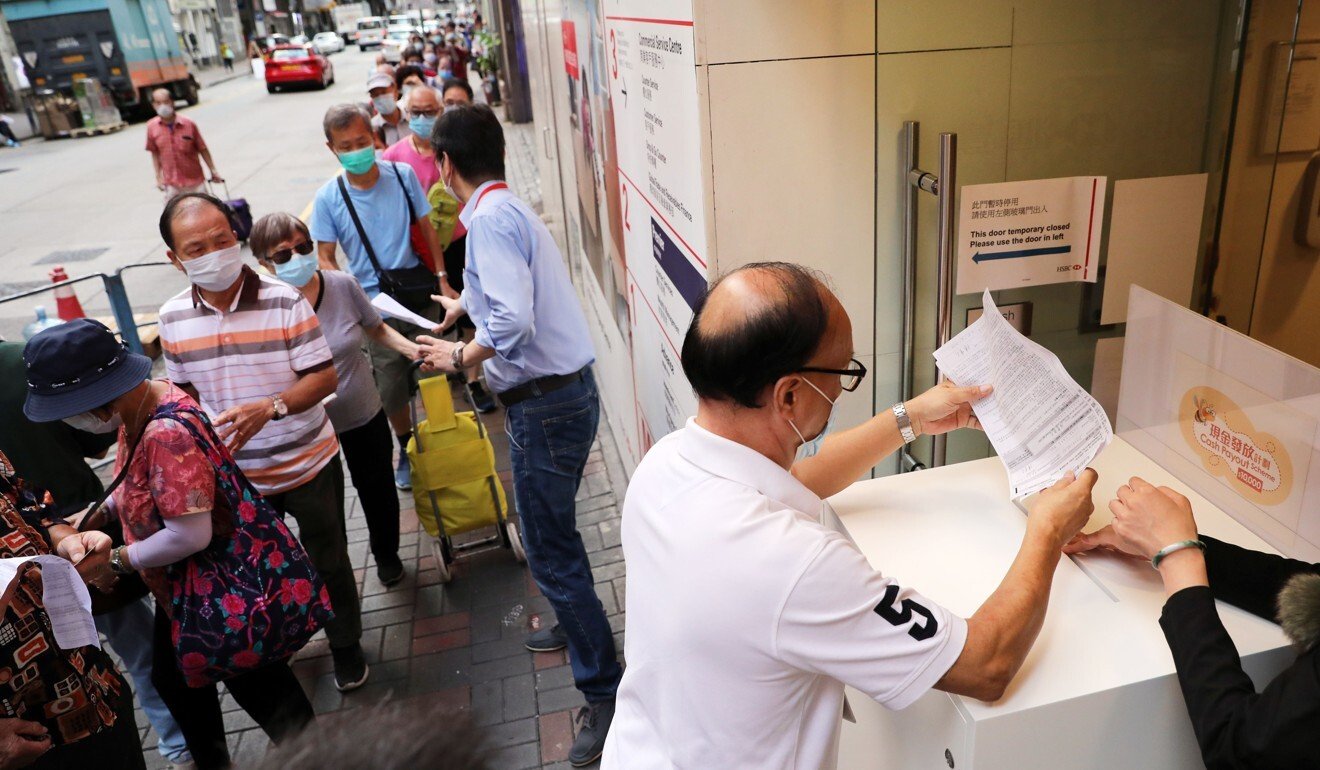
Coronavirus: Hong Kong’s low-income residents suffering more under strain of pandemic, with relief doing little to help, survey finds
- Some 70 per cent of respondents in poll by Society for Community Organisation report being either unemployed or underemployed
- Government relief measures, meanwhile, are either not enough or not reaching those most in need
The number of jobless and underemployed workers among Hong Kong’s low-income residents is about eight times higher than the overall unemployment rate, while more than a third do not benefit from government subsidies, according to an NGO report.
And in an apparent response to recent complaints from employees they were not benefitting from the Employment Support Scheme, the administration renewed a warning to companies over abusing the wage handout programme.
A survey of more than 330 low-income residents by the Society for Community Organisation (SoCO) found 28.4 per cent had lost their jobs between May and July, while underemployed people made up 52.3 per cent. Hong Kong’s overall unemployment rate for the same period, announced on Wednesday, stood at 6.1 per cent, while underemployment was at 3.5 per cent.
“The city’s low-income residents are living in a disaster zone compared to other people,” said SoCO community organiser Sze Lai-shan. “For those who have been unemployed for months, they are having to eat less or even take out loans.”
Hong Kong businesses beg for help as survey reveals many won’t last six months
Among the respondents, 75 per cent had been unemployed for a continuous period of three months. The survey also found that about 10 per cent of respondents were behind on rent.
“The government has been giving out subsidies, but the poorest among us are not getting a single cent,” Sze said.
A government spokesman warned on Sunday wage subsidies should go towards the salary of a particular month within the scheme’s three-month period. Failure to do so would require returning part or all the money received.
He also reminded companies their staff who were on no-pay leave were not regarded as paid employees and could not be considered part of their committed headcount for the month.
Hong Kong has, since the beginning of the year, announced several rounds of relief measures totalling some HK$290 billion (US$37.4 billion). Among them was a one-off HK$10,000 handout to permanent residents and the Employment Support Scheme, under which the government subsidised workers’ wages, capped at HK$9,000 (US$1,160) monthly for half a year through their employers.

However, 60 per cent of those surveyed by SoCO said they did not know whether their employers had applied for the subsidy, while others were still asked to take unpaid leave, even if the company had applied.
Of the low-income residents who were eligible to receive the one-off handout, 60 per cent said it barely covered their expenses. Another 30 per cent of respondents said they were ineligible.
Wong Chi-yuen, community organiser of SoCO, said the Employment Support Scheme should be benefiting workers rather than their employers.
“This is an employer support scheme rather than an employment support scheme; most of the people we talked to don’t even know how they can receive the money,” Wong said.
Hong Kong jobless rate dips to 6.1 per cent but worst not over, experts warn
The survey also asked respondents what relief measures would help, with up to 90 per cent saying an unemployment fund providing monthly support for three months to a year would alleviate the stress. More than half hoped the funding would amount to up to 60 per cent of their salaries.
SoCO urged the government to fine employers who still asked workers to take unpaid leave even after receiving money under the Employment Support Scheme, while also relaxing the criteria to allow even part-time workers to receive subsidies.
It also suggested the government set up an unemployment fund which would provide subsidies of up to 80 per cent of workers’ salaries, capped at HK$16,000, for up to six months.
But the city’s low-income residents were not the only ones feeling the economic strain of the pandemic.
The Hong Kong Manufacturing Industry Employees General Union surveyed 1,272 employees in the manufacturing sector between July 24 and 31, with more than half reporting being either unemployed (23 per cent), taking unpaid leave (13.4 per cent) or experiencing a pay cut (21 per cent). Some 53 per cent said their employment situation was worse than it was in April.
Hong Kong financial secretary warns against depleting coffers amid pandemic
About 67 per cent said they had not benefited from the government’s HK$81 billion Employment Support Scheme. Another 50 per cent said the wage subsidies were not sufficient to help cope with the difficulties.
More than three-quarters believed the introduction of subsidies to cover daily expenses would help ease their hardship, while almost as many supported quick cash handouts for the unemployed.
The union called on the government to introduce new short and medium-term measures to ease the plight of workers affected by the pandemic, including a special subsidy of HK$9,000 for six months for the jobless, cash handouts of HK$3,000 for six months for those forced to take unpaid leave or a pay cut, and measures to reshape the manufacturing industry with advanced vocational training.


